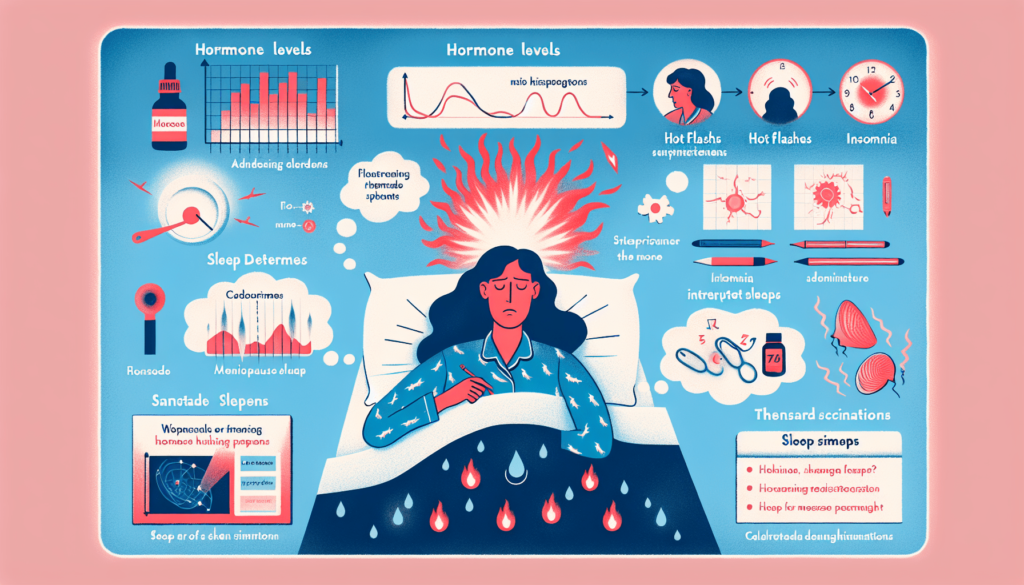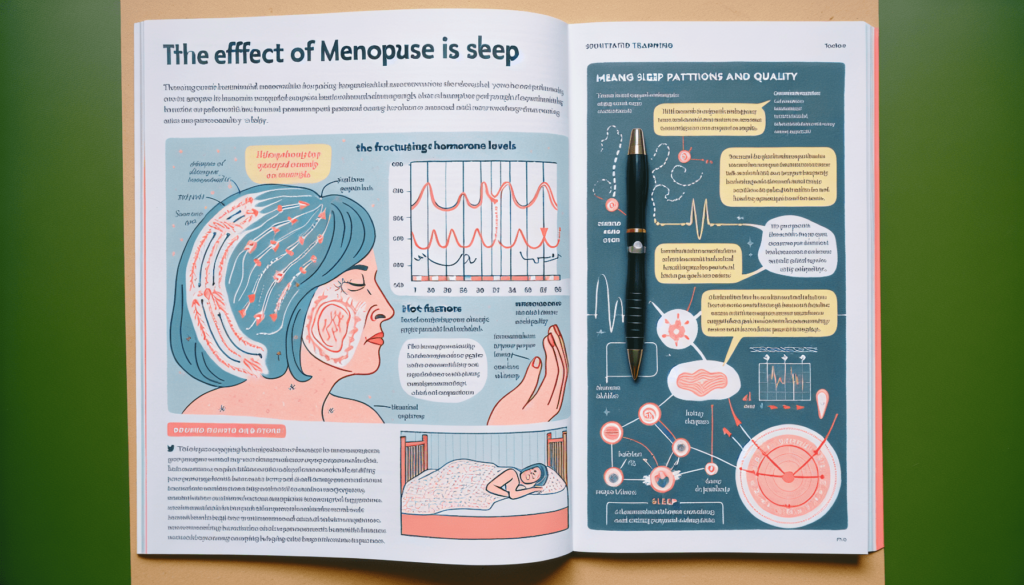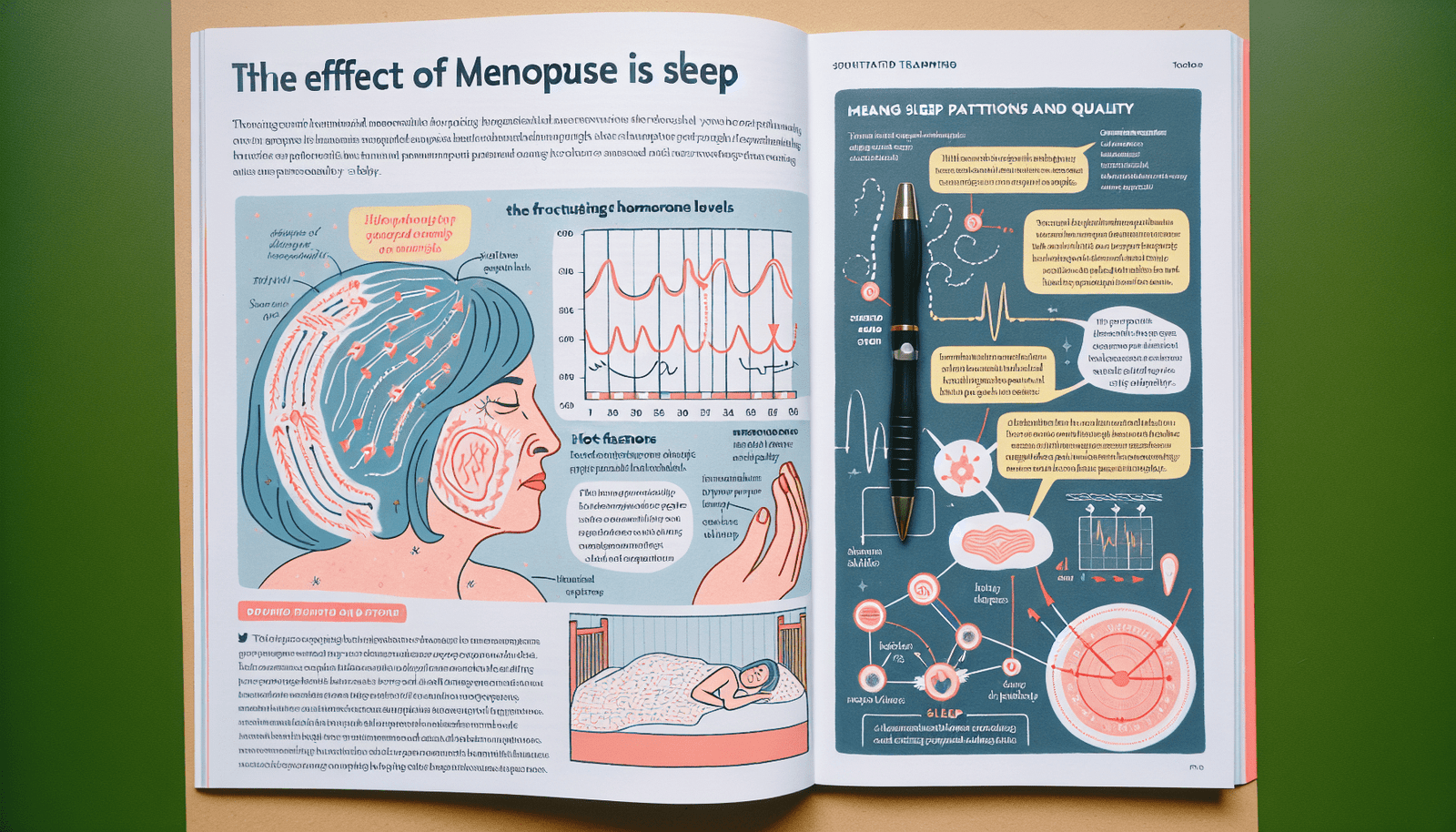During menopause, many women experience a range of symptoms that can disrupt their sleep patterns. Hot flashes, night sweats, and mood swings are just a few of the changes that can make it difficult to get a good night’s rest. With hormonal shifts taking place, the body’s internal thermostat is thrown off balance, leading to sudden heat sensations and excessive perspiration. As a result, sleep may be interrupted multiple times throughout the night, leaving women feeling fatigued and restless during the day. In this article, we will explore the various ways that menopause affects sleep and discuss potential strategies to promote better sleep quality during this transitional phase.

Changes in Hormone Levels
During menopause, your body goes through significant changes in hormone levels, particularly in estrogen and progesterone. These hormonal fluctuations can have a profound impact on your sleep patterns and quality. Estrogen helps regulate the body’s internal clock and the sleep-wake cycle, while progesterone promotes relaxation and helps you fall asleep. As these hormones decline, you may experience disruptions in your sleep.
Hot Flashes
Hot flashes are one of the most common symptoms of menopause and can greatly interfere with your sleep. These sudden feelings of intense heat often accompanied by sweating and flushed skin can be experienced during the day, but they are especially troublesome at night. Hot flashes can disrupt your sleep, causing you to wake up with drenched sheets and feeling uncomfortable.
Night Sweats
Night sweats, similar to hot flashes, can disrupt your sleep during menopause. They are characterized by excessive sweating during sleep, leading to wet pajamas and bedding. These episodes can be disruptive and uncomfortable, making it difficult to fall back asleep. Night sweats can also contribute to feelings of fatigue and tiredness throughout the day.
Sleep Disorders during Menopause
In addition to hormonal changes, menopause can also lead to the development or exacerbation of sleep disorders. These conditions can further disrupt your sleep and make it difficult to get the rest you need.
Insomnia
Insomnia is a common sleep disorder that can be triggered or worsened by menopause. It is characterized by difficulty falling asleep, staying asleep, or both. Hormonal changes, physical discomfort, and increased stress levels can contribute to insomnia during menopause. Insomnia can have a significant impact on your overall well-being, leaving you feeling exhausted and unable to function at your best.
Sleep Apnea
Sleep apnea is another sleep disorder that can become more prevalent during menopause. It involves pauses in breathing or shallow breathing during sleep, leading to disrupted sleep patterns and decreased oxygen levels in the body. The reduction in estrogen during menopause can contribute to the development of sleep apnea. It is important to seek medical attention if you suspect you may have sleep apnea, as it can have serious health consequences if left untreated.
Restless Legs Syndrome
Restless legs syndrome (RLS) is a condition characterized by an uncontrollable urge to move the legs, often accompanied by uncomfortable sensations such as tingling or crawling. These symptoms tend to worsen at night, making it difficult to relax and fall asleep. Restless legs syndrome can be exacerbated by hormonal changes during menopause, making it even more challenging to get a good night’s sleep.
Psychological Factors
Menopause can also have a significant impact on your psychological well-being, which can, in turn, affect your sleep. The hormonal changes and other physical symptoms associated with menopause can contribute to mood changes, anxiety, depression, and increased stress levels.
Mood Changes
Fluctuating hormone levels can intensify mood swings and lead to irritability, sadness, and emotional instability. These mood changes can make it difficult to relax and wind down at night, disrupting your sleep. It is important to be aware of these mood changes and seek support or treatment if they become overwhelming and interfere with your daily functioning.
Anxiety and Depression
Menopause can also increase the risk of developing anxiety and depression. The hormonal fluctuations, combined with the physical symptoms and life changes often associated with this stage of life, can contribute to feelings of worry, sadness, and hopelessness. Anxiety and depression can have a profound impact on sleep, leading to difficulties falling asleep, staying asleep, or experiencing restful sleep.
Stress
The physical and emotional changes that occur during menopause can lead to increased stress levels. Stress can negatively impact sleep, causing difficulties falling asleep and staying asleep. It is important to implement stress management techniques and seek support to help alleviate the effects of stress on your sleep and overall well-being.

Physical Symptoms
Alongside hormonal changes and psychological factors, menopause can also bring about various physical symptoms that can disrupt your sleep.
Joint and Muscle Aches
During menopause, many women experience joint and muscle aches, which can make it uncomfortable to find a comfortable sleep position and can awaken you throughout the night. The decrease in estrogen can lead to a decrease in collagen, a protein that supports joint and muscle health. Managing joint and muscle aches through gentle exercises, stretching, and over-the-counter pain relievers can help improve your sleep quality.
Urinary Problems
Menopause can also bring about urinary problems such as frequent urination at night and an increased risk of urinary tract infections. The need to get up and go to the bathroom can disrupt your sleep, making it difficult to maintain a continuous sleep cycle. It is important to manage urinary problems by practicing good hygiene, staying hydrated, and seeking medical attention if necessary to ensure optimal sleep quality.
Vaginal Dryness
Vaginal dryness is another physical symptom commonly experienced during menopause. This can lead to discomfort and pain during sexual intercourse and can also impact your sleep. Discomfort caused by vaginal dryness can make it difficult to relax and fall asleep comfortably. It is important to discuss vaginal dryness with your healthcare provider, as they can suggest appropriate treatments or lubricants to alleviate symptoms and improve sleep quality.
Tips for Better Sleep during Menopause
While menopause can present challenges when it comes to sleep, there are several strategies you can implement to improve your sleep quality and quantity.
Establishing a Sleep Routine
Establishing a consistent sleep routine can help signal to your body when it’s time to sleep and when it’s time to wake up. Going to bed and waking up at the same time each day, even on weekends, can help regulate your body’s internal clock and promote better sleep. Create a relaxing nighttime routine that includes activities such as reading, taking a warm bath, or practicing relaxation exercises to prepare your body and mind for sleep.
Creating a Sleep-Friendly Environment
Creating a sleep-friendly environment can contribute to better sleep during menopause. Make sure your bedroom is dark, quiet, and cool. Consider using blackout curtains, earplugs, or a white noise machine to block out any disturbances. Invest in a comfortable mattress, pillows, and bedding that support your sleep needs.
Managing Hot Flashes
To manage hot flashes during sleep, consider keeping your bedroom cool and well-ventilated. Use lightweight, breathable bedding and sleepwear. Keep a glass of cold water nearby to cool down during a hot flash. You may also benefit from using a fan or air conditioner to regulate the temperature in your bedroom.
Regular Exercise
Regular exercise can have numerous benefits during menopause, including improved sleep quality. Engaging in moderate-intensity aerobic exercise for at least 30 minutes most days of the week can promote better sleep. However, it is important to avoid exercising too close to bedtime, as it can be stimulating and interfere with sleep.
Avoiding Stimulants before Bedtime
To improve sleep quality, it is important to avoid stimulants such as caffeine and nicotine close to bedtime. These substances can disrupt your sleep and make it difficult to fall asleep and stay asleep. Opt for decaffeinated beverages and avoid smoking before bed.
Stress Reduction Techniques
Implementing stress reduction techniques can help manage the stress and anxiety often associated with menopause. Engage in activities such as meditation, deep breathing exercises, or yoga to calm your mind and relax your body before bed. Creating a bedtime routine that incorporates relaxation techniques can help prepare your body for sleep.
Medical Interventions
If lifestyle changes and self-care techniques are not sufficient to alleviate your sleep disturbances during menopause, there are medical interventions that you can discuss with your healthcare provider.
Hormone Replacement Therapy
Hormone replacement therapy (HRT) is a treatment option that involves taking estrogen or a combination of estrogen and progesterone to alleviate menopausal symptoms. HRT can help regulate hormone levels and improve sleep quality for some women experiencing menopause-related sleep disturbances. However, it is important to discuss the potential risks and benefits of HRT with your healthcare provider, as it may not be suitable for everyone.
Prescription Sleep Aids
In some cases, your healthcare provider may prescribe sleep aids to help manage sleep disturbances during menopause. These medications can be effective in promoting sleep, but they should only be used under the guidance and supervision of a healthcare professional. It is important to discuss the potential side effects and risks associated with sleep aids before starting any medication.
Alternative Therapies
There are also alternative therapies that may be helpful in managing sleep disturbances during menopause. Acupuncture, for example, has been shown to improve sleep quality and reduce hot flashes in some women. Additionally, certain herbal remedies and supplements, such as black cohosh or melatonin, may provide relief for sleep problems. It is important to consult with your healthcare provider before starting any alternative therapies to ensure they are safe and appropriate for you.
Lifestyle Changes
In addition to the tips provided earlier, making certain lifestyle changes can contribute to improved sleep during menopause.
Healthy Diet
Maintaining a healthy diet can support overall well-being, including sleep quality. Incorporate a variety of fruits, vegetables, whole grains, and lean proteins into your meals. Avoid consuming heavy or spicy meals close to bedtime, as they can cause indigestion and disrupt your sleep.
Maintaining a Healthy Weight
Maintaining a healthy weight can alleviate some of the physical symptoms associated with menopause and may improve sleep quality. Regular exercise and a balanced diet can help support weight management during this stage of life.
Limiting Alcohol and Caffeine Consumption
Alcohol and caffeine can negatively impact sleep during menopause. It is best to limit or avoid consuming alcohol and caffeinated beverages, particularly closer to bedtime. These substances can interfere with your sleep quality and make it difficult to fall asleep and stay asleep.
Alternative Therapies
In addition to lifestyle changes, some women find relief from menopause-related sleep disturbances through alternative therapies.
Acupuncture
Acupuncture is an ancient practice that involves the insertion of thin needles into specific points on the body. It has been shown to reduce hot flashes and improve sleep quality in some women experiencing menopause. If considering acupuncture, it is important to seek a qualified and licensed practitioner.
Herbal Remedies
Certain herbal remedies, such as black cohosh or valerian root, have been used to alleviate menopause symptoms, including sleep disturbances. However, it is important to consult with your healthcare provider before starting any herbal remedies, as they can interact with other medications and may not be suitable for everyone. Additionally, the efficacy and safety of herbal remedies may vary.
The Importance of Seeking Professional Help
If you are experiencing significant sleep disturbances during menopause, it is important to seek professional help. Consulting a healthcare provider with expertise in women’s health and menopause can help determine the underlying causes of your sleep problems and develop an appropriate treatment plan.
Consulting a Healthcare Provider
A healthcare provider can help assess your overall health and evaluate potential medical conditions or hormonal imbalances that may be contributing to your sleep disturbances. They can also provide guidance on lifestyle changes, recommend appropriate medical interventions, and monitor your progress.
Obtaining a Sleep Study
In some cases, your healthcare provider may recommend a sleep study to further evaluate your sleep patterns and identify any underlying sleep disorders. A sleep study involves spending a night in a sleep laboratory or using a portable device at home to monitor your sleep quality, brain activity, breathing, and other physiological parameters. This information can help guide treatment options and improve your sleep quality.
Conclusion
Sleep disturbances during menopause are common, but they don’t have to be a permanent part of your life. Understanding the changes in hormone levels, the development or exacerbation of sleep disorders, psychological factors, and physical symptoms associated with menopause is essential to effectively manage and improve sleep quality. By implementing the tips provided, considering medical interventions if necessary, and making lifestyle changes, you can find relief and enjoy better sleep during this transitional phase of life. Remember to seek professional help if your sleep disturbances are significantly impacting your daily functioning and overall well-being.
